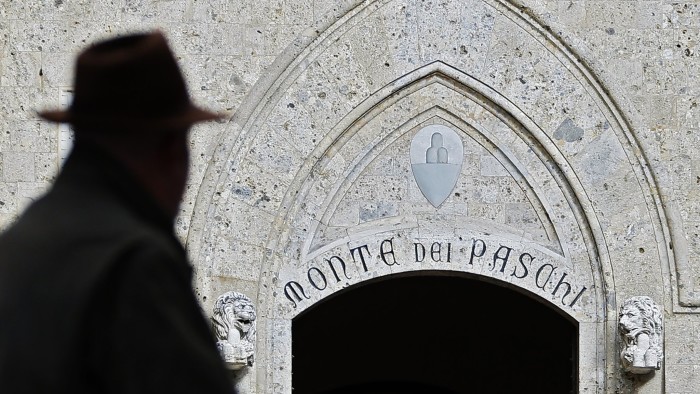Ditch bail-in rules to avoid Italian tragedy


Roula Khalaf, Editor of the FT, selects her favourite stories in this weekly newsletter.
Last week, one Brussels official dismissed the mounting crisis in Italy’s banking system — and the appeal for a state-aid waiver on a €40bn bailout — as the stuff of Italian comic opera.
If that attitude persists, the EU risks triggering a tragic repeat of the 2011 eurozone crisis.
The stand-off over Italy’s banks comes only days after Britain voted to leave the EU, an outcome in part prompted by a truculent EU unwilling to show pragmatism in the face of popular outrage over immigration.
Italy, whose banking system is in a state of mounting crisis, is the next test. Shares in its biggest lenders are down by as much as a half in the past two months alone. Monte dei Paschi di Siena, the number three in the market, is now trading at barely 10 per cent of the value of its net assets.
Rational explanation is tricky. The banks’ bad loan numbers are awful, but they were awful two months ago.
A hard-headed analysis would stress the positives. UniCredit, Italy’s biggest lender, now has a credible boss in Jean-Pierre Mustier. New laws have been passed to facilitate long overdue mergers among troubled mutual lenders. Access to funding is plentiful.
But investor nervousness has undercut all that. Brexit has hit the Italian stock market hard. It is still down 10 per cent, even as the UK has bounced, reflecting fears that the EU will flounder or even break up altogether.
Compounding that has been news that the European Central Bank is stepping up pressure on Italy’s lenders. Stress tests are imminent. And a stern ECB letter to MPS, leaked on Monday, revealed the bank had been ordered to cut bad loans by a third over two years.
The big issue with the ECB’s demand is that the bad debt is valued by MPS at about 40 cents in the euro, twice what the market seems willing to pay. The bank probably needs €5bn of fresh capital to cover the write-off in bad-debt values. MPS is a microcosm of the challenge facing Italian banking more broadly. The system is short of €45bn, say Berenberg analysts.
Ultra-low interest rates have squeezed margins. At the same time, Italy’s banks have been slow to adjust. The Spanish banking system did reform, stripping out weaker institutions, cutting costs and dealing with bad loans. Italy’s did not and its banks failed to build up capital quickly. Just compare Spain’s biggest bank with Italy’s. Santander has reported a core equity capital ratio of 12.4 per cent, compared with a 10.5 per cent minimum, as defined by the ECB once all incoming requirements are implemented. By contrast Unicredit’s ratio of 10.5 per cent is still short of its 10.75 per cent projected requirement, precisely at the time when extra capital will be needed to absorb bad debts.
There are five ways forward. All are problematic.
● On paper, and in line with new rules on bank insolvencies, institutions like MPS should be wound up by “bailing in” holders of the bank’s debt. But Italy seems to have sold bank bonds to retail depositors without telling them of the risks. The suicide of a Banca Etruria customer last year has deterred the authorities from using bail-in rules again.
● Prime minister Matteo Renzi has toyed with tapping the €700bn European Stability Mechanism — the fund used for other eurozone bailouts — but is wary of the stigma.
● Forcing a big bank to rescue a weaker one is another possibility. But Intesa Sanpaolo, the healthiest of Italy’s lenders, has long resisted playing the role. UniCredit deliberately appointed Mr Mustier, a non-Italian, as chief to avoid the risk of being captured by the establishment.
● Atlante, the rescue fund set up jointly by the big banks, could help in theory. But the €4.25bn fund has only €1.75bn of dry powder. Italy’s banks have up to €300bn of bad loans, depending on the definition of “bad”. MPS alone has €28bn of the most extreme bad loans.
● Given the scale of the problem, it is little wonder Mr Renzi seems to be veering towards a radical government bailout. Some experts believe he can dodge the two binding constraints — EU state-aid rules on the one hand and Italian debt limitations on the other.
Whichever way, this is not the time for the EU to be intransigent. Even in countries that haven’t mis-sold bank bonds, bail-in rules will prove flawed in any systemic crisis. When the pressure is on, burning bondholders — and spreading panic through the capital markets — will always feel too risky. Policymakers should realise that, and rethink.
Comments